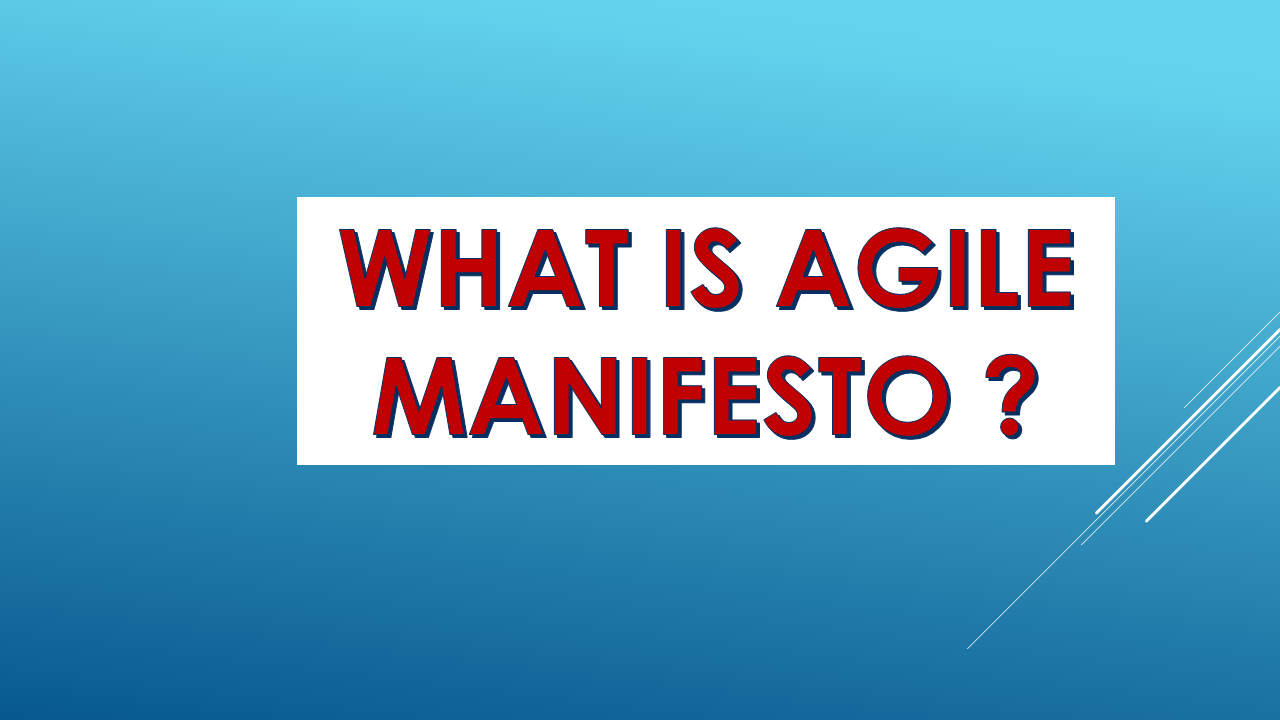What is agile manifesto ?
Agile Manifesto
The Agile Manifesto was created by a group of software developers who were frustrated with how long their projects took to develop. They wanted to create something that would allow them to deliver working code faster than they had been able to before. The result of their efforts was the Agile Manifesto, a set of principles that describe how to work effectively as a team.

The Agile Manifesto
The Agile Manifest is divided into three sections. The first section describes what makes an effective team. The second section outlines the practices that should be followed to achieve these goals. Finally, the third section describes the values that should guide the behavior of the team members.
What Makes A Good Team?
A good team is self-organizing. Each member contributes according to his or her skills and interests. There is no single person who knows everything about the project. Instead, each person learns from others and helps teach others.
A good team works together to produce the best possible product. Everyone on the team shares responsibility for understanding the system under development and communicating that knowledge to the rest of the team. No one person owns the design; instead, everyone collaborates to find solutions that meet the requirements.
A good team takes pride in its accomplishments and looks forward to future challenges. When someone completes a task successfully, he or she immediately starts planning the next step. People enjoy working on successful teams because they know that they will get to try out new things.
What Should Be Done To Create An Effective Team?
To create an effective team, you need to establish some ground rules. First, you must agree on the goal of the project. Then, you have to decide how much time you want to spend on the project. Next, you need to determine how many people will be involved in the project. Finally, you need to choose a process for managing the project.
Establishing Ground Rules
Before you start any project, you should establish some basic ground rules. These rules should apply to every aspect of the project. For example, you may decide that meetings will only take place when absolutely necessary. You may decide that there will be no more than two people in a room at once. Or you may decide that you will not use email during the day.
You should also establish ground rules for communication. For example, you might decide that you will not discuss the project outside of the team unless you have permission to do so. You could also decide that you will not share information until it becomes available to the entire team.
Determining How Much Time Will Be Spent On The Project
FAQ’S
What is Agile Manifesto principle?
The four core values of Agile software development as stated by the Agile Manifesto are: individuals and interactions over processes and tools; working software over comprehensive documentation; customer collaboration over contract negotiation; and. responding to change over following a plan.
Why is Agile Manifesto important?
Why is the Agile Manifesto important? The Agile Manifesto is a valuable resource for software development teams as it equips them with a flexible framework to guide their project management processes and uphold Agile best practices.
What does the Agile Manifesto contain?
The Agile Manifesto consists of four key values: Individuals and interactions over processes and tools.Working software over comprehensive documentation.Customer collaboration over contract negotiation.
What is most important according to the Agile Manifesto?
Our highest priority is to satisfy the customer through early and continuous delivery of valuable software. Customers should receive deliverables or iterations at regular intervals. Welcome changing requirements, even late in development.
How Agile Manifesto is use in project management?
The goal of the manifesto is to increase client involvement in the development cycles to ensure that the project meets expectations and that resources are not wasted building the wrong product. Since there is more than one agile process, each project and team is different
What do you mean by manifesto?
A manifesto is a published declaration of the intentions, motives, or views of the issuer, be it an individual, group, political party or government.
How do you write Agile Manifesto?
Here’s a great resource if you’re interested to learn more on the background on the Agile Manifesto, values and principles.
- Individuals and Interactions over Processes and Tools. …
- Working Software Over Comprehensive Documentation. …
- Customer Collaboration over Contract Negotiation. …
- Responding To Change Over Following A Plan.
What does the Agile Manifesto mean by value delivery?
The first principle of the Agile Manifesto is a commitment to value delivery: “Our highest priority is to satisfy the customer through early and continuous delivery of valuable software.” There is a lot to unpack here: Satisfying the needs of the customer is our highest priority.
How many Agile Manifesto are there?
The Agile Manifesto is comprised of four foundational values and 12 supporting principles which lead the Agile approach to software development. Each Agile methodology applies the four values in different ways, but all of them rely on them to guide the development and delivery of high-quality, working software
What are the 3 key elements of agile methodology?
If it’s decided that agile is the most appropriate development methodology to use, then the three key things that will enable the project to be a success are: collaboration, constant focus on business value, and appropriate level of quality.

Business Analyst , Functional Consultant, Provide Training on Business Analysis and SDLC Methodologies.
